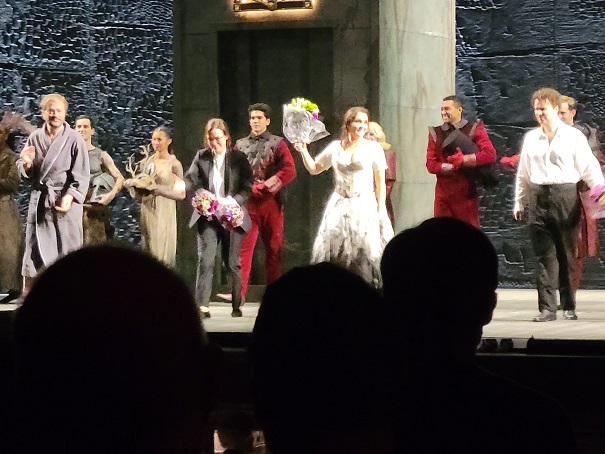Concert Diary: “Eurydice” at the Metropolitan Opera
December 9, 2021
New York, N.Y.
It takes a brave dude to descend into the Underworld to rescue his wife from the perpetuity of death. It takes a dude with a very particular set of skills, most notably being the greatest of all musicians, and hence able to charm Hades himself and the other guardians of this life-forsaken place.
The ancient myth of Orpheus and Eurydice still has a powerful appeal, and the theme — at least in its metaphorical form — shows up surprisingly often. The tale has been of particular interest to composers of opera: Jacopo Peri’s Eurydice from 1600 is the oldest known surviving opera, while Claudio Monteverdi’s L’Orfeo (1607) is the oldest opera that is still widely performed and recorded.
Fast forward 500 years to American composer Matthew Aucoin’s 2020 opera Eurydice, which I was able to see last night at the Metropolitan Opera in a marvelous production.
This new Eurydice is quite different from those of the past, for the libretto is by Sarah Ruhl, who based it on her 2003 play. Instead of focusing on the grief and determination of Orpheus after the death of his bride, she instead explores Eurydice’s experiences after her death, and particularly reuniting with her dead father, who has managed to avoid the purging of memories that normally accompanies the transition to the Underworld. Like Buffy in season six, Eurydice doesn’t necessary want to be rescued from the peace and comfort of death.
Removing the adventurous rescue aspect of the Orpheus and Eurydice story might seem to doom it to a ponderous meditation on death and family, but that doesn’t happen at all. Sarah Ruhl has a light and witty touch, combining magical realism with sparse poetic language. United with Matthew Aucoin’s music and Mary Zimmerman’s staging, an ideal synthesis has been achieved.
In Sarah Ruhl’s play (and Matthew Aucoin’s opera), Eurydice arrives in the Underworld via an elevator. She is wearing a traveling coat, and holding a suitcase, which turns out to be empty. She also has an umbrella, because of course it’s raining inside the elevator. Legend has it that Orpheus could charm even rocks with his music, so it’s not inappropriate that Eurydice encounters three life-size stones sung by a soprano, mezzo-soprano, and tenor, who quite vehemently lay down the rules of the Underworld. These rules prohibit any communication with the world of the living, but sometimes letters can be passed between the two worlds, although it’s never quite clear how this is possible.
In a video posted by the Met Opera featuring the creators of Eurydice, Matthew Aucoin describes his music as
explosively tonal, in the sense that I work with materials that might sound familiar. You know, a chord you’ve heard before, gesture you’ve heard before. But I tend to take them to extremes.
This is a good description. Despite often being dense and raucous, Aucoin’s music is quite accessible. His vocal settings are complex, but not excessively angular. They fit the speech. Aucoin draws great colors from the percussion-heavy orchestra, and can shift with agility from the passion of love or grief to a whacky wedding dance, but never drifting into silliness. The orchestra (playing under the baton of Serbian-born conductor Daniela Candillari in her debut with the orchestra) sometimes tended to drown out the singers (at least from my seats) but the text was projected on the back wall of the stage.
Eurydice was sung by soprano Erin Morley, who is luminescent if not quite loud enough in the role. Orpheus was baritone Joshua Hopkins, who was sometimes accompanied by counter-tenor Jakub Józef Orliński, giving the vocal lines a strange halo effect. Although Eurydice is quite fun, it does have moments that will cause a pang in anyone who has dealt with death and grief.
Here’s a shot of the curtain calls:
From left to right in the front row: Nathan Berg (in bathrobe) as Eurydice’s father, conductor Daniela Candillari, Erin Morley, and Joshua Hopkins:
One of my peculiar takeaways — emphasized by Matthew Aucoin’s many caressing musical settings of the name “Eurydice” — is how beautiful the name is, how much it sings. It’s quite surprising that it isn’t a more common name for women. Is the problem the tricky pronounciation? Try your-RID-eh-cee. (As Stephen Sondheim wrote about another name: “Say it loud and it’s music playing; say it soft and it’s almost like praying.”
